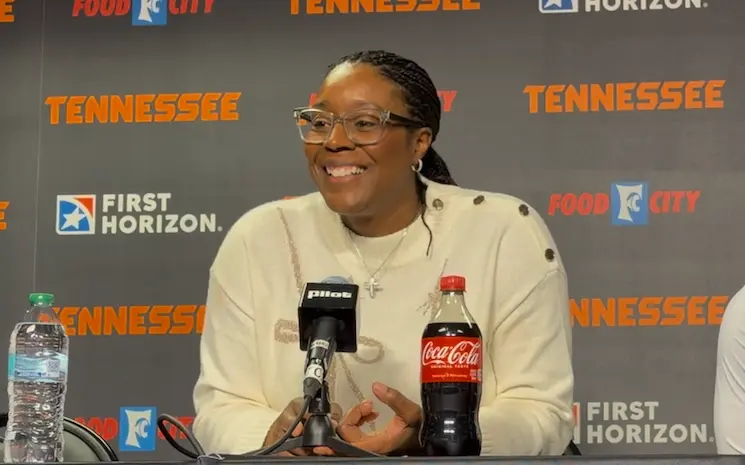
The ending to Tennessee’s 2018-19 basketball season has left a sour taste in the mouths of Vol fans everywhere.
The Vols were supposed to make a deep run in the NCAA Tournament this year, the same year that saw Tennessee ascend to No. 1 in the AP Poll for four-straight weeks, the same year that saw UT win a school record 19-straight games at one point in the season.
But it didn’t happen.
Tennessee was eliminated in the Sweet Sixteen in overtime by Purdue. The Vols were looking to make it back to the Elite Eight for the first time since 2010 and only the second time ever. Instead, the Boilermakers made it to their first Elite Eight since 2000, and it was Purdue fans that got to celebrate the end of a drought.
Vol fans are left with disappointment and plenty of questions after what should’ve been the most memorable season of men’s basketball possibly ever. But this year doesn’t have to be it for Tennessee. In fact, it shouldn’t be.
To me, part of the reason why Vol fans feel so stung by the way this season ended is because Tennessee hasn’t had sustainable success in men’s basketball in a while. And the most recent time there appeared to be a foundation for a sustainable program ended up blowing up in UT’s face.
This year was only the second-straight season in which the Vols made it to the NCAA Tournament, and it’s only the third time over the last eight years that UT has earned a berth in the tournament. In fact, this year marked only the 14th time Tennessee has made it into the NCAA Tournament since the field expanded to 64 teams in 1985. That means the Vols have missed making the tournament 21 times in that span.
The Vols have missed the tournament more often than they’ve made it over the last 35 years.

The longest streak Tennessee has of making the NCAA Tournament came in the Bruce Pearl era. All six of Pearl’s teams made it to the Big Dance, but that run ended abruptly after he was fired after the 2010-11 season. But when you compare that run of six-straight seasons in the tournament to other teams around the country, it’s a pretty small streak.
When you look at it that way, it’s no wonder Vol fans have felt as hurt and disappointed as they have after Tennessee’s Sweet Sixteen exit.
Vol fans aren’t used to Tennessee making the NCAA Tournament on a regular basis, so each time the Vols do make it in, it feels more like a do-or-die situation. This team in particular felt like a “once in a generation” type of team because of all the circumstances that had to come together for them to get this far.
This year’s team was a group of former three-star prospects who were developed into stars by a coach who was cast off from his former school for underachieving too regularly. This year’s group of Vols are arguably the biggest group of overachievers in Tennessee men’s basketball history.
To fans, it felt like this year was Tennessee’s best shot at making a deep NCAA Tournament run for a very long time. But it doesn’t have to be.
Simply making it to the NCAA Tournament has been a chore for Tennessee in the program’s history. But Rick Barnes and his staff have, in my opinion, finally helped build a sustainable product at UT.
For as little consistency as the Vols have had getting to the NCAA Tournament, they’ve actually found a surprising amount of success once they’ve gotten there in recent history. Tennessee has made it to the Sweet Sixteen five times since 2007, and they’ve only made it to the tournament a total of eight times in that span. That means the Vols have made it to at least the Sweet Sixteen 62.5 percent of the time they’ve made the NCAA Tournament, and they’ve advanced to the Elite Eight 12.5 percent of the time.
For comparison, Kentucky has made it to the Sweet Sixteen eight of the 11 times (72.7 percent) they’ve made it to the NCAA Tournament in that span, Duke has made it eight of the 13 times (61.5 percent) they’ve made it to the tournament, Kansas has made it nine of the 13 times (69.2 percent) they’ve reached the tournament, Louisville has made it six of the 11 times (54.6 percent) they’ve gotten in, Syracuse has made it six of the nine times (66.7 percent) they’ve made it, Gonzaga has made it six of the 13 times (46.2 percent) they’ve reached the tournament, and Villanova has made it just four of the 12 times (33.3 percent) they’ve gotten into the tournament.
Tennessee is on par or not far behind most of the power basketball programs when it comes to their efficiency in reaching the Sweet Sixteen. They just have to do a better job of reaching the next level. You know how you do that? Get to the tournament more often.
Kentucky, Duke, and North Carolina fans are likely all upset their seasons ended in the Elite Eight this year, but they know that next year brings another opportunity for their teams to make a run. They count on it every year. It’s an anomaly if any of those teams don’t earn berths to the NCAA Tournament. The same can’t be said for Tennessee, though. History shows it’s more of an anomaly for UT to make the tournament than it is for them to miss it.
For seasons like this not to feel like as much of a gut punch, that has to change. And with the way the future looks at Tennessee right now, the odds of that changing are pretty high.
Admiral Schofield, Kyle Alexander, Grant Williams, Jordan Bone, Lamonte Turner, and Jordan Bowden will all be gone one way or another by the end of next season. But once they’re all gone, Tennessee’s basketball program is still in good hands. Those players helped establish a foundation and a culture at UT, and Barnes and his staff are doing their part to make sure the future remains bright.
Tennessee welcomes in five-star guard Josiah James next season, and he’ll be joined by two three-star prospects who could be the next hidden gems who are developed into studs by UT’s staff. Stretch-four forward Drew Pember and lanky small forward Davonte Gaines bring a ton of upside in Tennessee’s 2019 signing class, and they bolster the star power of James.
Not only that, but the Vols’ highest-rated player on this past year’s roster didn’t even play a single minute for the team. But he’ll be available for next season and has the potential to be an instant impact player.
D.J. Burns was a consensus four-star prospect coming out of high school, and he was a top-100 overall player before he reclassified to the 2018 class. He dropped some, but he remained a top-125 overall player and needed this past redshirt season to work on his conditioning. The 6-foot-9, 270-pound forward will continue to trim down some, but he brings the height and size inside that Tennessee has lacked recently.
Yes, next year’s success will largely depend on whether or not Williams and Bone return for their senior seasons and on the progress and development of players like John Fulkerson, Yve Pons, Jalen Johnson, and others. But adding Burns and James into the mix along with Jordan Bowden and Lamonte Turner are reason enough to be optimistic.
This year felt so important to Tennessee basketball because Tennessee basketball isn’t used to sustained success. But Barnes and his staff look like they’ve finally gotten the Vols on the right path.
Tennessee has another highly-rated prospect committed to them in the 2020 class in borderline five-star forward Corey Walker. The Vols are also in a very good spot for five-star guard Jaden Springer, four-star guard and No. 1 in-state player Keon Johnson, and five-star center Walker Kessler in that cycle.
With who the Vols have returning next season, who they’re bringing in on the recruiting trail (and who they could add as transfers), and who they’re likely to bring in over the next few seasons, it looks like Tennessee’s future is in solid hands.
This season doesn’t have to be the only memorable season over the next five or six years. Tennessee is plenty capable of making a deep NCAA Tournament run in the future. They just have to keep getting there regularly.



